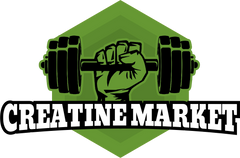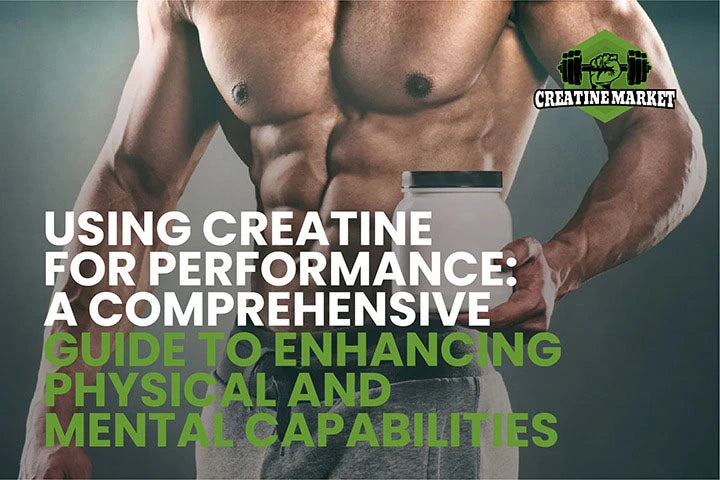Are you looking to optimize your mental performance and support long-term brain health? Creatine for brain health has emerged as a promising supplement backed by scientific research. While most people associate creatine with muscle building and athletic performance, its benefits for cognitive function are equally impressive and well-documented.
What is Creatine and How Does it Support Brain Function?
Before diving into the specific benefits of creatine for cognitive performance, it's essential to understand what creatine is and its role in brain function. Creatine is a naturally occurring compound that plays a crucial role in energy metabolism, particularly in tissues with high energy demands – including both muscles and the brain.
Your brain consumes approximately 20% of your body's energy despite making up only 2% of your body weight. This high energy requirement makes creatine particularly important for optimal brain function and cognitive performance.
Creatine for Brain Health: Understanding the Benefits
When examining creatine for brain health, research has shown several key benefits that make it an attractive supplement for cognitive enhancement. The brain stores creatine and uses it to rapidly produce energy during periods of high mental demand. Here are the primary benefits of creatine supplementation for brain function:
- Enhanced mental performance during complex problem-solving tasks
- Improved focus and concentration during extended periods of mental work
- Better cognitive function during stressful situations requiring quick thinking
- Superior learning and memorization capabilities
- Maintained mental clarity during sleep-deprived states
- Increased mental energy reserves for demanding cognitive tasks
Research indicates that maintaining optimal creatine levels in the brain can help protect against neurological stress and support overall cognitive resilience. The compound works by ensuring that your brain cells have access to the energy they need, precisely when they need it most.
Does Creatine Help Memory?
One of the most frequently asked questions is "does creatine help memory?" The answer, supported by multiple scientific studies, is yes. Creatine supplementation has been shown to improve both short-term and long-term memory through several mechanisms.
For short-term memory, creatine works by increasing energy availability for memory formation and enhancing neural plasticity during learning. Users often report improved attention span during memory tasks and better recall during high-pressure situations. The immediate effects can be particularly noticeable when tackling complex mental challenges or during periods of stress.
Long-term memory benefits are equally impressive. Regular creatine supplementation provides support for consistent neural energy levels and may offer protection against age-related memory decline. Users typically experience enhanced learning capacity over extended periods and improved retention of complex information, making it particularly valuable for students and professionals engaged in continuous learning.
Creatine for Cognitive Function: A Deeper Look
Understanding how creatine for cognitive function works reveals its broad impact on mental performance. The supplement supports various aspects of cognition through multiple pathways, leading to enhanced mental processing speed and improved decision-making capabilities. Perhaps most notably, users experience better mental endurance during challenging tasks and reduced mental fatigue throughout the day.
Regular creatine supplementation can help maintain consistent cognitive performance throughout the day, particularly during periods of high mental demand or stress. This sustained enhancement of cognitive function makes it especially valuable for professionals who need to maintain peak mental performance over long periods.
How Does Creatine Affect the Brain?
To understand how does creatine affect the brain, we need to examine its mechanisms of action. Creatine works through several essential pathways to support brain function.
In terms of energy production and storage, the brain uses creatine to maintain its energy reserves through the creatine phosphate system, which helps rapidly regenerate ATP – the primary energy currency of cells. This system ensures that your brain has immediate access to energy when needed, preventing mental fatigue and maintaining optimal performance.
Creatine also provides significant neuroprotective benefits. It helps protect brain cells by stabilizing cell membranes and reducing oxidative stress. Additionally, it supports mitochondrial function and prevents energy depletion during periods of stress, making your brain more resilient to various forms of stress and fatigue.
The impact on brain cell communication is equally important. Creatine enhances neural communication by supporting synaptic plasticity and maintaining optimal neurotransmitter levels. It aids in signal transmission between neurons and helps maintain proper membrane potential, all of which contribute to improved cognitive function.
Studies on How Creatine Affects Your Brain
Examining studies on how creatine affects your brain reveals compelling evidence for its cognitive benefits. A 2022 review in Nutrients found that creatine supplementation improved overall cognition.
Additional studies published in 2023 in Life by the way of an article titled Newly Synthesized Creatine Derivatives as Potential Neuroprotective and Antioxidant Agents on In Vitro Models of Parkinson’s Disease demonstrated improved brain performance during complex mental tasks, while research in aging populations showed protective effects against cognitive decline.
Clinical trials have revealed enhanced mental performance in sleep-deprived individuals, demonstrating creatine's potential role in maintaining cognitive function under adverse conditions. The research consistently shows improved memory in vegetarians and elderly individuals, enhanced cognitive performance under stress, and better mental performance during sleep deprivation.
Optimal Dosage and Supplementation Strategies
To maximize the cognitive benefits of creatine, following proper supplementation guidelines is crucial. The recommended protocol typically includes an optional loading phase of 20g daily for 5-7 days, divided into 4 doses, followed by a maintenance phase of 3-5g daily. Timing is flexible – creatine can be taken any time of day, but consistency is key for optimal results.
For best results, stay well-hydrated while supplementing and consider taking creatine with a meal for better absorption. Monitor your response and adjust dosage as needed, always maintaining consistent daily intake for optimal benefits.
Creatine Supplements Safety Considerations
When using creatine for cognitive enhancement, it's important to understand its safety profile and potential considerations. Here are the key safety aspects to know:
- Extensively studied and proven safe through numerous clinical trials
- No significant side effects when following proper dosage guidelines
- Well-tolerated by most individuals with minimal risk of adverse reactions
- Established long-term safety record through years of research
- Safe for daily use without risk of dependency
- Compatible with most medications and supplements (though always consult healthcare provider)
The supplement can be particularly beneficial for several groups:
- Students and academics requiring sustained mental focus
- Professionals with high cognitive demands
- Older adults concerned about cognitive decline
- Individuals under significant mental stress
- People experiencing sleep deprivation
- Anyone seeking to optimize their mental performance
Conclusion: Maximizing Cognitive Performance with Creatine
The evidence supporting creatine for brain health is substantial and growing. From enhancing memory and cognitive function to protecting brain cells and supporting long-term mental health, creatine offers comprehensive benefits for cognitive performance.
Whether you're a student looking to improve study efficiency, a professional seeking enhanced mental clarity, or someone interested in maintaining long-term brain health, creatine supplementation offers a safe and effective way to support your cognitive goals.
Remember that while creatine is a powerful tool for cognitive enhancement, it works best as part of a comprehensive approach to brain health that includes proper nutrition, adequate sleep, and regular mental exercise. Start incorporating creatine into your daily routine and experience the benefits of enhanced cognitive performance firsthand.
References
McMorris T, Harris RC, Swain J, Corbett J, Collard K, Dyson RJ, Dye L, Hodgson C, Draper N. Effect of creatine supplementation and sleep deprivation, with mild exercise, on cognitive and psychomotor performance, mood state, and plasma concentrations of catecholamines and cortisol. Psychopharmacology (Berl). 2006 Mar;185(1):93-103. doi: 10.1007/s00213-005-0269-z. Epub 2006 Jan 17. PMID: 16416332.
Forbes SC, Cordingley DM, Cornish SM, Gualano B, Roschel H, Ostojic SM, Rawson ES, Roy BD, Prokopidis K, Giannos P, Candow DG. Effects of Creatine Supplementation on Brain Function and Health. Nutrients. 2022 Feb 22;14(5):921. doi: 10.3390/nu14050921. PMID: 35267907; PMCID: PMC8912287.
Kostadinova I, Kondeva-Burdina M, Marinov L, Vezenkov LL, Simeonova R. Newly Synthesized Creatine Derivatives as Potential Neuroprotective and Antioxidant Agents on In Vitro Models of Parkinson’s Disease. Life. 2023; 13(1):139. https://doi.org/10.3390/life13010139




